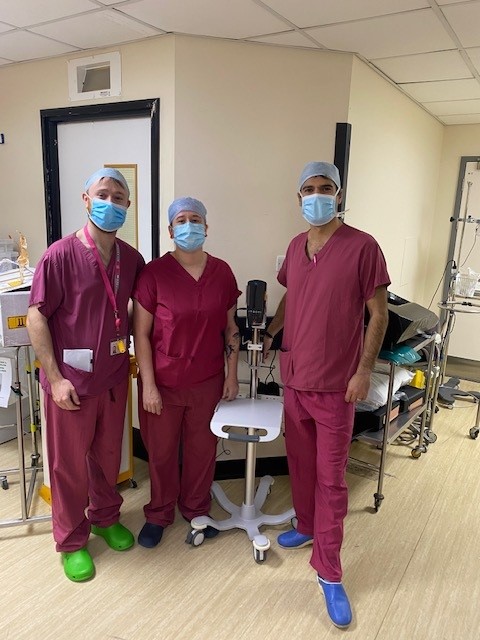
New procedures in urology are helping to improve treatment for patients with bladder cancer and enlarged prostates, as well as reducing the numbers requiring general anaesthetic surgery at Princess Royal Hospital.
Patients with small tumours in the bladder can now receive Trans Urethral Laser Ablation (TULA) treatment.
TULA examines the bladder using a thin camera on a flexible tube that takes a small biopsy and uses a laser to remove abnormal tissue in the bladder.
The common first treatment method, TURBT – Trans Urethral Removal of Bladder Tumour – would typically involve a larger, more rigid camera that would take a bigger biopsy, as well as take place in a main theatre with the patient under general anaesthetic.
The TULA procedure is a minimally invasive method that takes 15 minutes and can be done as an outpatient procedure using local anaesthetic, reducing waiting times for theatre slots. This shortens the patient’s journey drastically, allowing them to go home the same day and avoid an overnight stay.

Tim Hemington, 71 from Lewes, was diagnosed with bladder cancer in 2019 and before receiving TULA was first given TURBT.
He said: “I had TURBT four times, but the TULA system was so much better. I was in and out the same day, so it was a lot quicker and there was less soreness and bleeding with this procedure.”
“Every single staff member I came across was fantastic and I couldn’t speak more highly of them. Although my bladder cancer is of the lowest grade, they still treated me as if I was really poorly, so it was nice to be so well cared for and even the consultant and I had lovely banter.”
Today, Tim is doing well and is receiving a vaccine which helps to prevent bladder cancer growing back or spreading into the deeper layers of the bladder.
Last year, the team introduced a new technique using a laser to treat men with an enlarged prostate.
Living with an enlarged prostate obstructs the flow of urine and patients can experience frequent urinating, at longer periods.
HoLEP- Holmium Laser Enucleation of the Prostate – is a highly efficient and minimally invasive treatment that uses laser technology to remove tissue that is blocking urine flow through the prostate by cutting the tissue into easily removable pieces.
This procedure has a lower risk of significant bleeding, with reduced transfusion rates, and is the most reliable procedure for an obstructive prostate.
Like TULA, this method can be carried out as a day case procedure, allowing patients to get home quicker without having to stay in hospital overnight.
Patients were previously referred to Tunbridge Wells Hospital for a similar procedure, so its introduction at the Princess Royal means that patients who would have previously gone to Kent can receive treatment much closer to home.

Mr Paimaun Zakikhani, Clinical Lead and Consultant Urological Surgeon said: “There are a range of new and innovative techniques being developed for urology and our team is always keen to look at anything which can improve the experience of our patients.
“To be able to offer our patients new and effective procedures that avoids the risks associated with a general anaesthetic and allows patients to walk in and walk out of hospital in less than an hour with their cancer treated, is incredible. We want to achieve the best possible outcomes for our patients whilst providing fantastic patient experience and the highest quality of care.”
UHSussex continue to aim to provide excellent care for patients and are due to open a Urology Investigation and Treatment Centre (UITC) at Princess Royal Hospital in autumn 2023.
As part of a multi-million-pound investment to further improve patient experience, this centre will be able to accommodate at least 1,000 new patients each month, more than double the current capacity, providing swift diagnosis and treatment without needing to admit patients.
This follows the Urology Investigation Unit (UIU) which opened at Worthing Hospital in 2021.